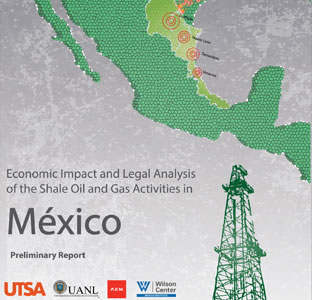UTSA and key Mexican partners release preliminary report on impacts of energy reform on the Mexican Economy


(May 28, 2015) – UTSA's Institute for Economic Development, the Universidad Autónoma de Nuevo León, the Asociación de Empresarios Mexicanos, and the Woodrow Wilson Center have released a preliminary report to gauge the growth and the effects that the oil and natural gas industry will have for residents and decision makers in Mexico.
The report contains a general overview on the Energy Reform, an economic background on oil and natural gas (especially trade between U.S. and México) a state level profile, infrastructure and educational certificates specific to oil and natural gas education. The core study area concentrates on the economic impact on the following Mexican states: Coahuila, Nuevo León, Tamaulipas and Veracruz.
“Opportunities for unconventional or shale oil and gas productions in Mexico are in the earliest stages of development. Due to its close proximity to major shale field development in South and West Texas, Mexico is particularly well positioned to take advantage of unconventional extraction techniques,” said Thomas Tunstall, research director at the UTSA Institute for Economic Development.
After being elected in 2012, Mexican President Enrique Peña Nieto worked with other ruling parties to create a “Pact for Mexico” which included 11 important reforms, one of which was energy. The initial proposed reforms focused on removing hydrocarbons from the sectors controlled directly by the government. Thus opening up oil and gas fields through exploration and production contracts with the Mexican government, as well the granting of permits for the development of a robust and well-integrated hydrocarbons infrastructure.
México sits atop an estimated 545 trillion cubic feet (Tcf) of shale natural gas reserves, and additional trillions of cubic feet of conventional reserves. The bulk of México’s shale prospects appear to lie in the north and northeastern sections of the country, where infrastructure is often largely undeveloped. This means that in order to tap the country’s bounty of shale oil and gas, infrastructure such as roads, housing, rail, pipeline and many others will have to be built out first. The ability to develop a suitably skilled workforce will be key to long-term success. Security issues must also be addressed.
The second part of the report introduces a preliminary Business Roadmap, A Guide for the Operator, which briefly describes the necessary steps a prospective operator in the upstream activity in Mexico will have to comply with in order to expand or initiate operations in Mexico.
--------------------------------------------
Download the full preliminary report at : http://bit.ly/Mexico-OilGas-Prelim
Connect online with UTSA on Twitter, Facebook, YouTube and Instagram.
Events
This event will acknowledge graduating seniors from the McNair Scholars program at UTSA before inducting the new cohort of scholars into the program.
North Paseo Building (NPB 5.140), Main CampusAt this memorable celebration, UTSA graduates will be introduced one-by-one to cross the stage and accept their doctoral degrees.
Arts Building Recital Hall, Main CampusRoadrunner Walk is an event for graduating students to have a memorable walk on campus to celebrate an important milestone and their achievements. Graduates will walk along the Paseo while being celebrated by the UTSA community, friends, and family members.
Student Union Paseo, Main CampusCelebrate the accomplishments of College of Education and Human Development, College for Health, Community and Policy, College of Sciences and University College.
Alamodome, 100 Montana St.Celebrate the accomplishments of Alvarez College of Business, College of Liberal and Fine Arts and Klesse College of Engineering and Integrated Design.
Alamodome, 100 Montana St.

